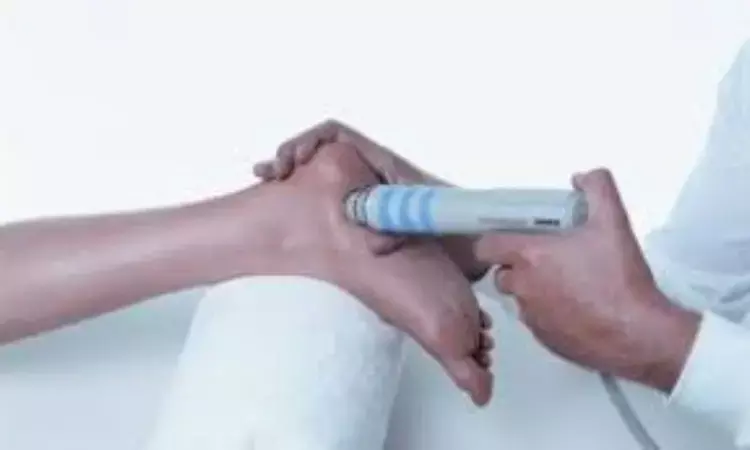- Home
- Medical news & Guidelines
- Anesthesiology
- Cardiology and CTVS
- Critical Care
- Dentistry
- Dermatology
- Diabetes and Endocrinology
- ENT
- Gastroenterology
- Medicine
- Nephrology
- Neurology
- Obstretics-Gynaecology
- Oncology
- Ophthalmology
- Orthopaedics
- Pediatrics-Neonatology
- Psychiatry
- Pulmonology
- Radiology
- Surgery
- Urology
- Laboratory Medicine
- Diet
- Nursing
- Paramedical
- Physiotherapy
- Health news
- Fact Check
- Bone Health Fact Check
- Brain Health Fact Check
- Cancer Related Fact Check
- Child Care Fact Check
- Dental and oral health fact check
- Diabetes and metabolic health fact check
- Diet and Nutrition Fact Check
- Eye and ENT Care Fact Check
- Fitness fact check
- Gut health fact check
- Heart health fact check
- Kidney health fact check
- Medical education fact check
- Men's health fact check
- Respiratory fact check
- Skin and hair care fact check
- Vaccine and Immunization fact check
- Women's health fact check
- AYUSH
- State News
- Andaman and Nicobar Islands
- Andhra Pradesh
- Arunachal Pradesh
- Assam
- Bihar
- Chandigarh
- Chattisgarh
- Dadra and Nagar Haveli
- Daman and Diu
- Delhi
- Goa
- Gujarat
- Haryana
- Himachal Pradesh
- Jammu & Kashmir
- Jharkhand
- Karnataka
- Kerala
- Ladakh
- Lakshadweep
- Madhya Pradesh
- Maharashtra
- Manipur
- Meghalaya
- Mizoram
- Nagaland
- Odisha
- Puducherry
- Punjab
- Rajasthan
- Sikkim
- Tamil Nadu
- Telangana
- Tripura
- Uttar Pradesh
- Uttrakhand
- West Bengal
- Medical Education
- Industry
Extracorporeal Shockwave Therapy Effective in Treating Diabetic Foot Ulcers, reports study

A recent meta-analysis published in the Diabetes Research and Clinical Practice unveiled the effectiveness of extracorporeal shockwave therapy (ESWT) in treating diabetic foot ulcers (DFUs). The study reviewed randomized controlled trials (RCTs) published before August 8, 2023 and highlighted the potential benefits of ESWT as a therapeutic option for DFUs.
This research was carried out with extensive search of databases, including PubMed, EMBASE, Cochrane Controlled Register of Trials (CENTRAL), and Web of Science, to identify RCTs that investigated the efficacy and safety of ESWT for DFUs. A total of 10 trials met the selection criteria and were analyzed using STATA 14.0 software to evaluate the overall effectiveness of the treatment.
The analysis revealed that ESWT had a significantly higher rate of completely healed ulcers when compared to the control groups, with a risk ratio (RR) of 1.57 and a 95% confidence interval (CI) of 1.26 to 1.95. This indicated that patients receiving ESWT were 57% more likely to undergo complete healing of their ulcers than the individuals receiving standard treatments.
In addition to improved healing rates, ESWT was associated with a lower rate of unchanged ulcers, with a risk ratio of 0.25 (95% CI: 0.14 to 0.42). This meant that the risk of DFUs remaining unchanged during the treatment period was significantly reduced for the individuals undergoing ESWT by demonstrating the potential of this therapy to prevent ulcer stagnation.
Further subgroup analysis found that ESWT outperformed both hyperbaric oxygen therapy (HOT) and the standard of care (SOC) which further supports its effectiveness as a superior treatment option. The patients who underwent ESWT also faced a significant increase in their transcutaneous partial oxygen pressure (TcPO2), with a mean difference of 1.71 (95% CI: 1.22 to 2.19, p < 0.001). This improvement in oxygenation of the ulcer site is crucial in promoting tissue healing and reducing the risk of infection which are two major concerns in DFU management.
When it comes to safety, the analysis showed no significant differences between ESWT and the control groups in terms of treatment-emergent adverse events (TEAEs). While the rate of ulcers that showed at least 50% improvement was higher in the ESWT group, the difference was not statistically significant. These findings suggest that ESWT is not only effective but also well-tolerated by patients, with a safety profile comparable to the existing treatments. Overall, this study illuminates the potential of ESWT to improve ulcer healing and overall patient outcomes which is a promising advancement in diabetic care.
Source:
Wu, F., Qi, Z., Pan, B., & Tao, R. (2024). Extracorporeal shock wave therapy (ESWT) favors healing of diabetic foot ulcers: A systematic review and meta-analysis. In Diabetes Research and Clinical Practice (p. 111843). Elsevier BV. https://doi.org/10.1016/j.diabres.2024.111843
Neuroscience Masters graduate
Jacinthlyn Sylvia, a Neuroscience Master's graduate from Chennai has worked extensively in deciphering the neurobiology of cognition and motor control in aging. She also has spread-out exposure to Neurosurgery from her Bachelor’s. She is currently involved in active Neuro-Oncology research. She is an upcoming neuroscientist with a fiery passion for writing. Her news cover at Medical Dialogues feature recent discoveries and updates from the healthcare and biomedical research fields. She can be reached at editorial@medicaldialogues.in
Dr Kamal Kant Kohli-MBBS, DTCD- a chest specialist with more than 30 years of practice and a flair for writing clinical articles, Dr Kamal Kant Kohli joined Medical Dialogues as a Chief Editor of Medical News. Besides writing articles, as an editor, he proofreads and verifies all the medical content published on Medical Dialogues including those coming from journals, studies,medical conferences,guidelines etc. Email: drkohli@medicaldialogues.in. Contact no. 011-43720751


